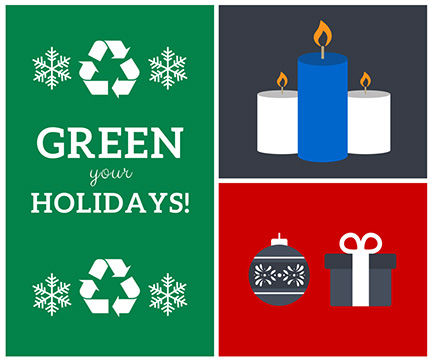Greening the Holidays
According the Environmental Protection Agency, the volume of household waste in the United States generally increases 25 percent between Thanksgiving and New Year’s Day – about 1 million extra tons.
This holiday season commit to reducing, reusing and recycling. Eco Promotional Products offers the following advice for eco-friendly holidays:
Pre-plan. Strategically plan your shopping trips to use less gas and minimize pollution and don’t wait until the last minute to ship gifts. The USPS, major shipping carriers and retailers all offer shipping guidelines on their websites. They show the last days to ship ground, the greenest and most economical shipping method. If you find yourself without a gift on December 23 or 24, send an e-gift certificate instead of shipping overnight.
Buy eco-friendly, reusable gifts. Consider the environmental impact when choosing gifts. If you have a coffee lover on your list, stick a gift card in a reusable coffee mug. Electronics lovers will appreciate solar powered chargers or speakers and there are many great eco-friendly bamboo kitchen items for home chefs. When buying gifts that require batteries, give the recipient rechargeable batteries with a charger.
Get creative when wrapping presents. While traditional wrapping paper is accepted in some curbside recycling programs, it can be difficult to recycle. The tape attached the paper makes it challenging to recycle. Additionally, papers that are covered in glitter, shiny or very thin generally cannot be recycled. Tissue paper can be recycled but it is usually made from recycled content. Similar to thin wrapping paper, it doesn’t have as many fibers to be recycled. Instead, save and reuse the tissue paper or compost it. Earth911.com offers suggestions to traditional wrapping paper, such as wrapping in a dishtowel that can be reused or making your own wrapping paper with magazines. Don’t add additional packaging waste by using gift tags. Instead, choose seeded gift tags that can be planted and enjoyed for many years.
Recycle your holiday lights and donate decorations you no longer want or need. Many municipalities as well as retailers such as Ace Hardware and Home Depot will recycle lights that no longer work. Don’t toss old ornaments or decorations; donate them to a thrift store where someone else may find joy in the items.
Recycle Christmas trees and wreaths. While artificial trees may appear to be better for the environment, many environmentalists will disagree. The majority of artificial trees sold in the U.S. are made overseas and can’t be recycled. When they have reached the end of their lifecycle, artificial trees end up in landfills. The business of Christmas trees is not considered deforestation because trees sold to consumers are sustainably farmed. Tree farming also helps fight global warming. Buying a real tree supports the U.S. economy and “Treecycling” offers many benefits when returning the natural source back to the earth.
Give the gift of green. Choose environmentally friendly charities during the holiday giving season. Consider donating to organizations committed to the environment such as Wildlife Conservation Network, Sierra Club, The Nature Conservancy, or Trees for the Future. You can also support many green organizations by giving the gift of a yearly membership to a nature center, botanic garden, arboretum or wildlife conservatory.



